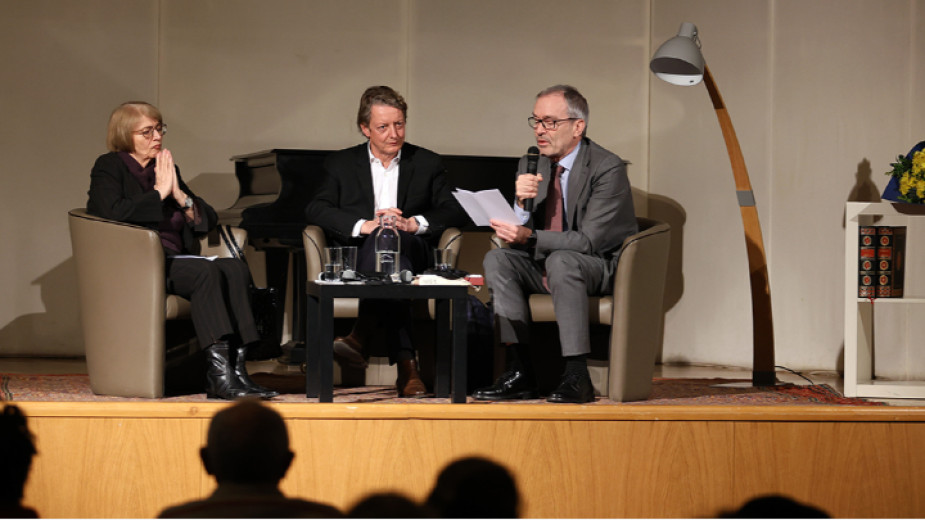
At the end of 1988 and the beginning of 1989, the newly elected president of France François Mitterrand went to several capitals of the changing Eastern block. After travelling to Czechoslovakia and before going on to Warsaw, Mitterrand came to Sofia, where he was welcomed with honours by what looked like the rock-solid party and state leader Todor Zhivkov. On 19 January, there was a reception at the French embassy with a group of intellectuals known for their positions against the totalitarian rule, among them the author of the banned book Fascism who would go on to become the first democratically elected president of Bulgaria – Zhelyu Zhelev. Foremost French philosopher of Russian origin Michel Eltchaninoff, author of Inside the Mind of Vladimir Putin, Lenin Walked on the Moon and The New Dissidents, a researcher of Putinism and new dissidence, analyzes the real influence the event that came to be known as “Breakfast with Mitterrand” had on Bulgaria and Eastern Europe in 1989, the year that was also symbolic for France – 200 years since the French Revolution:
“Of course, we cannot believe the president of another country changed the course of development of the country. That would be naïve. The dynamics were already in existence in Bulgaria, but five years later, at their next meeting with François Mitterrand, things had changed. The word people wanted to bring to the limelight was “freedom”. I think Mitterrand came so as to say that word. The Bulgarian dissident intellectuals were already carrying this word with them but maybe this event encouraged them to practice it more fully.”
Despite the hopes of the ultimate triumph of democracy and human rights after the disintegration of the USSR, it turns out people around the world still need grand narratives, and ideologies have come back to life: “Decades after the Berlin wall fell we are faced with ideologies promoting empires and war. There is a war raging in Europe today which will, without doubt, go on for a long time and could have unpredictable consequences,” says Michel Eltchaninoff.
What does “dissident” mean?
The word actually has religious roots – in the 16th century there were dissidents among the protestants. Michel Eltchaninoff says there are two things typical of dissidents: suffering and ingenuity. 
“The dissidents were people who knew power was incomparably more powerful than them but that they could also destabilize it. For example, I read the book by Zhelyu Zhelev (Fascism – editorial note) which he wrote in 1967, later, in 1982 it was published and right away it was withdrawn from sale. It does more than just provide ample information – it describes the structures of totalitarianism, but there is mockery there, tongue-in-cheek. He knew all too well that readers would replace the word “fascism” with “communism” in their heads and would, in fact, read the book as criticism of totalitarian communism in Bulgaria in the 1960s, 1970s and 1980s.”
As to the nostalgia for the totalitarian past, Eltchaninoff believes it is understandable with people who went through those times without encountering any problems:
“This nostalgia is unbeatable. It won’t yield to any reasoning. Vladimir Putin makes use of it to try to expand his dominance. Obviously there is a battle going on, Russia is using this nostalgia. Putin says the disintegration of the USSR is the biggest disaster of the 20th century, forgetting about the concentration camps, GULAG etc. He talks like someone from the Soviet era, a Homo Sovieticus, who wants to win over all nostalgias for the regime. He takes advantage of the memory of World War II. He takes advantage of all kinds of memory – he plays on Soviet memory, the memory of the Russian help against the Ottoman Empire, Orthodoxy, the Slavic languages and so on, but he instrumentalizes them.”
How “Lenin walked on the moon”
“Lenin died exactly 100 years ago – in January 1924. He never went to the moon – I am sharing this sensational information with you. The title is just fantasy. In his circle there were people influenced by a movement called “cosmism”. They thought science could one day help us resurrect the dead. This idea has now appeared in the US with transhumanism. Back then, in the Soviet Union, there were people, even among the Bolsheviks, who thought Lenin can be resurrected and that is why his body has to be preserved. Now, 100 years later, Lenin’s body is still inside the mausoleum in the Red Square in Moscow, and science probably can, according to some, still resurrect the dead. In my book, I wanted to tell the story of this idea, which was born at the end of the 19th century, secretly crossed over to the 20th century, and today resurrected in Silicon Valley in California. So that there exists a connection between Lenin and the American transhumanists.”
Translated and posted by Milena Daynova
Photos: BTA, facebook.com/InstitutFrancaisdeBulgari
Pipes from the end of the 17 th , the 18 th and the 19 th century and the tradition of growing tobacco in Bulgaria are presented in the newest exposition at the Museum of Archaeology in Burgas. “Pipes like this are to be found often on the..
In Bulgaria, when we talk about a person with bad luck, we often say: "Ah, what a Marko Totev!" But who exactly was Marko Totev, and how did his name become a byword for a person with ill fortune and a bad luck? "He was a Bulgarian public figure..
30 March marks the end of the most blessed time of the year, as Muslims call the month of Ramadan. This year it started on 1 March, and the most important obligation Muslims have during this 30-day period is to refrain from food, drink and temptation..

+359 2 9336 661
